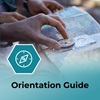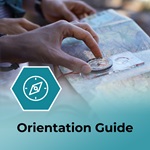So you’ve got your small group ready to go: you picked a time and place, you selected what you want to study, and you’ve got people showing up for it! What do you do now? The first meeting together can have a lot of fun energy, but there can also be a lot of anxiety in people—especially if it’s a new group and they don’t know many people there, or if they haven’t experienced a small group before. It’s important to make good impression at that first meeting. How do we make our first meeting fun, compelling, and informative?
1. Keep it Relational
The most important goal on the first night is to set up the relational feel that you want the group to have and help everyone feel comfortable with each other. This is what sets small groups apart from classes and other meetings. It’s also the easiest way to ease people’s anxiety—after all, it’s sort of like the first day of school. As the leader, introduce each person who arrives to the other people in the group.
Don’t rush the start of the group on the first week. People may show up late because they are nervous or they might have trouble finding the place you’re meeting. Instead, intentionally engage in casual conversation before sitting down to start the group discussion. When you do gather everyone to start, it might help to call out the relational tension to show them they’re not alone and it’s okay to laugh about it. You could say something like, “Let’s just all feel awkward together—it’ll be fun!” or, “Kinda feels like the first day of school doesn’t it? Don’t worry, we’re way less mean than those kids!” You can also mention that it may take a few weeks to learn each other’s names, and that’s normal. (To help with this, you could use nametags for the first weeks.)
Icebreaker questions are a great tool to use anytime to help put people at ease, to get them comfortable talking, and to help them get to know each other. They’re especially valuable at the first meeting. Sharing even one or two personal things creates lots of opportunity for connecting with each other. People will learn they’re in similar careers, live near each other, have kids the same age, or come from the same hometown. My favorite icebreakers for the first week are:
- Tell us your name, how long you’ve lived in this community, and what you do for a living.
- Share one of your favorite things about your current job.
- Share your favorite local restaurant that you’d recommend.
2. Cast a Clear Vision
The first week is your chance to cast a clear and compelling vision about what group members can expect their group experience to be like. It’s often helpful to hand out a small list of “Group Guidelines” (click here for ideas of what to include). You don’t want to make them feel overwhelmed with “rules,” but setting up simple guidelines can help everyone feel more comfortable. I like to include:
- Everything that is shared in this group stays here—it’s all confidential.
- The goal is for everyone to be heard in this group, and for no one to dominate.
- When people share, we listen without judging, criticizing, or giving advice.
- We commit to pray for each other.
In addition, it’s helpful to be clear about the start and end time for the meetings. I like to commit to ending the group on time every week, and then I ask them to commit to being on time so we can start on time every week. This helps group members plan better, and it immediately starts to build trust. I also like to ask people to tell me if they won’t be able to make it. Life happens, and not everyone will be able to make it every week, but you as the leader definitely want to know if someone can’t make it.
Depending on what you plan to study in the group, make sure group members are prepared. Let them know where to purchase the book (or that you will get the book for them), or let them know to bring their Bible each week (and whether it’s okay to use a Bible app on their phone or tablet). If you’re using video curriculum, let group members know that and if they will need any accompanying book or questions ahead of time. I’ve found it’s really helpful to share the vision for the study you’ll be doing together. This is an opportunity to get them excited about it, so share how you hope it will impact them, why you’re excited about it, and any interesting details that might pull them in. Your excitement will be contagious, so don’t under-sell it!
Lastly, spend some time talking about your goals for the group in general. Maybe your hope is that friendships will formed or that people will learn new things about the Bible. If you’d led groups before, share why you love leading groups. If it’s your first time leading, share why you’ve decided to start. When I was a new leader, I liked to say something like, “I’m still pretty new to leading, so I appreciate your grace as I figure it out.” This put me at ease and the rest of the group at ease, too.
3. Find the Balance
There’s pressure to start with a bang. We want to get to know each other, share expectations, start the study, give everyone a memorable moment, and more. But don’t give into the pressure to do all these things on the first night. Be sure to end on time (or a little early) the first week to set up the expectation that you’ll start and end on time. You also don’t want to overwhelm your group members with information. It’s really okay to not even touch the study the first night. Instead, you can focus on introductions, icebreakers, and guidelines.
At the same time, you want the first week to feel valuable so people want to come back. After all, the last thing you want is for people to feel like they wasted their evening. You also want to communicate that you have a plan and that it’s not all go-with-the-flow. So there is a balance to find.
Another caution is to not force the relational part to move too quickly. Make sure to personally introduce everyone to each other, but it’s okay if not everyone has a deep conversation with each of the group members. Don’t be surprised if people leave pretty quickly from your group rather than stick around to socialize. That’s totally normal, and it doesn’t mean you had a bad meeting. The fact is that it typically takes a few weeks for that relational comfort to build to a level where people stick around to chat for a while.
Remember that the ultimate goal is that your group members leave the first meeting having met some people, knowing what to expect in the group, and trusting you are a safe leader who will lead them into a time of relationship building and faith building. That leaves them wanting more, and excited to come back! And it’ll leave you feeling the same way.
—Carter Moss is a Campus Pastor and Life Groups Director for Newbreak Church, a large multi-site church in San Diego, and an advisor for SmallGroups.com.














